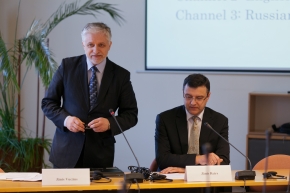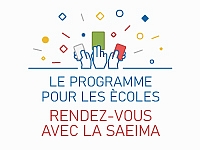 Galerie
Galerie
Cooperation in research requires strategic agreement on priority research areas to be developed in each of the Baltic States. That was the shared opinion of the Baltic Assembly delegates and representatives of research and innovation on Friday, 22 March, when during a parliamentary seminar held by the Education, Science and Culture Committee of the Baltic Assembly they discussed strengthening cooperation among the Baltic States in research and innovation as part of the BIRTI (Baltic Innovative Research and Technology Infrastructure) project.
“Today’s meeting defined various tasks that each of the Baltic States has to carry out. For us the development of research and innovation depends heavily on improving the infrastructure, but for Estonia and Lithuania it is essential to solve the human resources issue,” summed up Jānis Vucāns, Committee Chairman.
The participants of the seminar stressed the need to agree on priority research and innovation areas to be developed in each country in order to avoid overlapping when, for example, applying for EU funding. Indriķis Muižnieks, Member of the Council of BIRTI Union, reported that as part of the BIRTI project in Latvia it is planned to develop innovation in three areas: biopharmacy and organic chemistry; nanostructured materials and high-energy radiation; as well as smart technology engineering and ICT. Juras Banys, Acting Rector of Vilnius University, noted that Lithuania has great potential for developing materials science and nanotechnology.
Representatives of the ministries of education of all three countries expressed their commitment to prepare strategy for specialisation in various spheres of research and innovation.
“The upcoming meeting of the Baltic ministers should clarify specific areas and ways for us to pool recourses and share knowledge. At the same time, we should ensure the continuity of academic cooperation,” said Vucāns.
Further development of the BIRTI project in Lithuania will depend on results of the meeting of the education ministers of the Baltic States because the challenge for Lithuania is the internal coordination of the project on the inter-institutional level, pointed out Albertas Žalys, representative of the Ministry of Education and Science of Lithuania.
The participants of the seminar agreed that further cooperation in research depends to a large extent on the personal initiative of the parliaments, governments and academics of the Baltic States. Jānis Reirs, Deputy Head of the Latvian delegation to the Baltic Assembly, reminded the audience that it took a long time to promote Baltic cooperation in medicine procurement, but the project demonstrated that if there is personal will and initiative, everything is possible.
When discussing the current achievements, the participants of the seminar appreciated the memorandum of understanding concluded by the education and science ministers of the Baltic States.
Regarding potential development of the BIRTI project, Vadims Murašovs, representative of the Ministry of Education and Science of Latvia, stated that Latvia plans to form a working group of Baltic ministers, to continue attracting funding and to involve experts from the EU’s support instrument JASPERS. Toivo Räim, representative of the Ministry of Education and Science of Estonia, emphasised Estonia’s readiness to share its successful experience in attracting funding because almost half of the financing for research in Estonia comes from abroad.
Saeima Press Service







